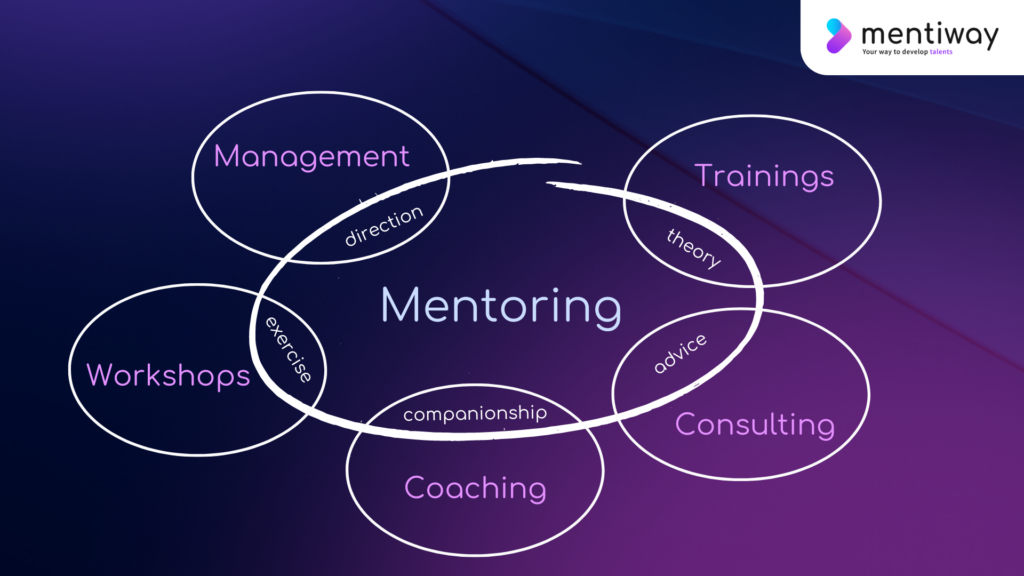Mentoring program case studies – results of mentoring in companies
Mentoring has many benefits – both for the participants themselves and for companies or organisations. In the first respect, we have carried out a dedicated survey of the HR industry; in the second, we ask Mentiway platform users on an ongoing basis about their evaluation of mentoring. However, in addition to these declarative and, nevertheless, subjective feelings, there are also more measurable effects of implementing mentoring programmes in a company. In this article, I will present what I believe to be the most interesting case studies of this type, mainly concerning companies from the USA, where the tradition of using this form of development is richest.
Table of contents
- Benefits for organisers
- Benefits for Mentors and Mentees
- Case studies of the effects of implementing mentoring
Benefits of implementing mentoring in the company – HR and L&D point of view
Even before discussing the above-mentioned case studies, let me remind you which benefits of mentoring are mentioned most frequently – first by representatives of HR teams and then by Mentors and Mentees themselves.
We can learn the point of view of representatives of HR teams from a study commissioned by Mentiway 2023. According to this study, the most frequently mentioned benefits of mentoring include:
- Building relationships within a company
- Increased staff motivation and commitment
- Knowledge transfer and retention in the organisation
At the same time, this survey showed that the vast majority of HR team representatives have a positive view of the effectiveness of mentoring (88%) and just under half of companies (44%) would also like to implement this form of development at their company.
Benefits of mentoring for the participants themselves
On the other hand, we have the perspective of participants in mentoring programmes – Mentors and Mentees.
In this respect, it is worth mentioning first and foremost that 100% of those who use the Mentiway platform recommend mentoring as a form of development, with almost 90% giving top marks in surveys.
Mentoring combines the benefits of various forms of task improvement – consulting, training, workshops, counselling and team management.

Benefits for Mentees
Among the most frequently cited benefits of mentoring for Mentees is much more than what may appear at first glance – i.e. simply competence development. Mentees cite among the benefits for themselves among others:
- Greater self-confidence
- Increased belief in own resources
- Regular support received
- Sense of being recognised and valued
- Greater clarity of professional and personal goals
- Receive career development assistance
- Increasing the chances of promotion
- Development of selected skills and competences
- Learning new skills and competences
- Increased self-awareness and insight
- Receive many useful tools for your own work
- Assistance in finding time just for yourself
Benefits for Mentors
For Mentors and Mentorees, the benefits are a little different, but they are there too. This is worth emphasising – many Mentors and Mentorees choose to participate in pro bono mentoring programmes, seeing many benefits for themselves in their participation, and overlooking the financial aspect altogether. Mentors and Mentors most often see the following benefits of mentoring for themselves:
- The satisfaction of sharing knowledge.
- Improving as a Mentor, accreditation.
- The satisfaction of participating in the development of another person.
- Podniesienie własnych kompetencji liderskich takich jak:
- active listening,
- giving feedback,
- communication skills,
- goal setting,
- asking questions.
- Being inspired by the experiences of others, broadening perspectives.
- The satisfaction of returning the favour for help received earlier.
- Getting to know other Mentors and sharing experiences with them.
- Increasing self-awareness.
Case studies of mentoring implementation in a company
Of course, what I have listed above are, as I mentioned at the outset, just perceptions – subjective perceptions of mentoring by organisers and participants. However, there is a proven impact of mentoring on the wider functioning of whole teams and companies.
Below are some case studies found on the Internet. I have chosen them to present the effects in as diverse a way as possible. Each case study approaches the issue of mentoring a little differently.
Mentoring and mental health at work
The first aspect of the benefits of mentoring relates to mental health. It is worth noting first and foremost that mentoring is consciously used by companies and corporations in the USE to improve mental health.
According to the research:
- mentoring improves self-esteem and reduces feelings of loneliness,
- it also dulls negative emotions, improves students’ mental health and their academic performance (especially after the Covid-19 pandemic),
- participating as a Mentor reduces stress and anxiety in police officers,
- mentoring is ranked 4th among the methods consciously used by companies in the US to improve the mental health of their employees.
Sun Microsystems: employee promotions twice as fast
Another case study concerns a mentoring programme run from 1996 to 2009 at Sun Microsystems. The programme was called Sun Mentoring and over these 14 years involved more than 7,000 mentoring pairs.
The programme was implemented in parallel in multiple phases. It covered both new recruits and existing employees. Interestingly, there was also a mentoring version for fresh Vice Presidents – helping new VPs take on new responsibilities.
These programmes and their detailed results are very well described in the report available at this link: https://dl.acm.org/doi/pdf/10.5555/1698217
Hi, my name is Thomas. I am the Co-Founder of Mentiway. We are happy to share our knowledge and support organisations on their way to success! 💪 If you are interested in how to efficiently and effectively implement a mentoring programme in your organisation using technology:


Some of the most interesting outcomes of these mentoring programmes include:
- Participants in mentoring programmes were promoted 2x faster than other employees. The annual promotion rate for the former was 33%, while the rate for the others was only 15%.
- Almost 50% of Mentors chose to participate in mentoring again after completing their previous mentorship.
- The turnover rate for employees participating in mentoring was 15% lower than for the rest of the employees. The average annual turnover rate for mentoring participants was 6.2% and 7.3% for the rest of the employees.
- There was also an attempt to estimate the ROI (return on investment) for mentoring for the years 2000 – 2002. The ROI indicated by the authors of the study was 1000% (i.e. profits 10 higher than costs). However, a lot of estimations and simplifications are necessary with such calculations, so this figure should be taken with a full dose of scepticism.
Siemens: three times less staff turnover
A similarly sophisticated analysis to IBM was done in 2016 by Anton Duvall, CFO at Siemens Building Technologies. He analysed some 7,500 employees (including 1,200 participants in an internal mentoring programme) for salary increases, promotions and quits. It is worth noting here that Anton excluded employees rated lower by managers from the group of those not participating in mentoring.
His analyses show that:
- the time between promotions of mentored employees was 25% shorter than that of non-mentored employees (44.6 vs 59.4 mc),
- the time between promotions for mentored managers was 30% shorter than for non-mentored managers (39.9 vs 56.8 mc),
- the average salary increase for mentored employees was 35% higher than for non-mentored employees, and for managers the difference was already 61%,
- turnover of mentored employees was three times lower than that of non-mentored employees (0.7% vs. 2.2% annual turnover),
- Anton estimates that the savings from lower staff turnover could be around 67%.
The full summary is available here: https://www.fm-magazine.com/issues/2016/dec/mentors-effect-on-salary-and-retention.html .
Amazon: mentoring programme for 160,000 participants
The second programme I would like to cite is interesting because of its significant scale. The Amazon Mentoring Program (AMP) was launched in 2016 and initially covered just under 19,000 employees worldwide. After a few years, the programme has grown to as many as 160,000!
Interestingly, mentoring at Amazon is made up of as many as 100 smaller programmes dedicated to selected areas and objectives covering, among others:
- Mentoring for new employees
- Peer 2 peer mentoring
- Mentoring for veterans
- Mentoring for leaders
Programme outcomes include, but are not limited to:
- The sheer scale of the programme is incredible, involving almost 200,000 employees in 100 different mentoring programmes
- Satisfaction with participation in the programme is 86%
- Staff promotions 8% faster
More data: https://get.chronus.com/rs/910-YDI-216/images/Amazon-Employee-Mentorship-CaseStudy.pdf
Google: Career Guru
Another unique programme is the one run at Google called Career Guru. Its creators noticed that one of the qualities that united the best managers at Google was the fact that they were good coaches. This led them to implement coaching (although in practice it was more of a mentoring process) for all employees.
In the first two years of operation, around 900 engineers benefited from the programme. On the Mentor/Coach side, there were 350 Googlers with at least two years’ experience at Google, a senior position and specialisation in one of 12 areas: sales, career development, team development, leadership, team management, parenting, innovation, new employee induction, well-being, presentation art and respect building.
More about the programme: https://www.linkedin.com/business/talent/blog/talent-engagement/google-career-coaching-boost-employee-engagement
Meta-analysis of the effects of implementing mentoring programmes
The next example is different from the others, as it concerns collective research. I came across a meta-analysis done as a thesis by a student at the University of Boise (Idaho, USA). Mark Douglas Morgan in 2020 decided to review several hundred academic papers on mentoring and extract aggregate information from them on how companies and organisations evaluate the mentoring programmes they implement.
The author of this compilation finally identified the seven categories most frequently mentioned and studied as an effect of mentoring implementation. These are:
- Career Resilience Ability to adapt to all situations, including disruptive change. The mentee demonstrates professional resilience by coping well with new conditions, maintaining a sense of comfort, competence and satisfaction in the new conditions. Lack of occupational resilience results in ongoing occupational stress, leading to occupational burnout.
- Career Success Professional success occurs when the mentee has reached a high level in their profession. Elements of success include salary, promotions, status, job and life satisfaction. There are two types of professional success: Objective career success, defined as perceived success such as promotion, seniority, salary and increased responsibility. Subjective career success is defined by the mentee’s satisfaction with their current career. Examples include development opportunities, happiness, work-life balance.
- Employee Engagement It is a desire for personal growth and learning. Committed employees identify with the direction of the organisation, have an emotional connection to the organisation and express an intention to stay with the organisation. An uncommitted employee may exhibit organisational deviance by behaving in ways that undermine organisational norms and cause potential harm to the organisation.
- Mutual Development Mutual development is the synergistic power of the mentoring relationship, which allows the pair to work together to achieve more goals, generate more knowledge and access more resources as a couple than they could individually.
- Personal learning It is the acquisition of skills, knowledge and competences that contribute to career outcomes.
- Mentee Satisfaction It is the satisfaction and enjoyment of working with an experienced Mentor. There is also a phenomenon here where satisfied mentees align their expectations with the support provided.
- Professional Exposure Professional exposure occurs when the Mentee’s visibility within the company increases through job assignments and interactions with ‘working influencers’. Because successfully managing these interactions and assignments requires political skills, the Mentor must share knowledge of processes, people and systems and provide protection from the Mentee to help the protégé avoid actions that could damage their image and reputation.
The full study is available here: https://scholarworks.boisestate.edu/cgi/viewcontent.cgi?article=2788&context=td . You will also find links to all the scientific papers analysed.
A guide to implementing effective mentoring in an organisation
Are you interested in mentoring? Are you considering introducing this form of development in your organisation? Also check out our extensive step-by-step guide to successfully implementing mentoring in your company.
Hi, my name is Thomas. I am the Co-Founder of Mentiway. We are happy to share our knowledge and support organisations on their way to success! 💪 If you are interested in how to efficiently and effectively implement a mentoring programme in your organisation using technology:








